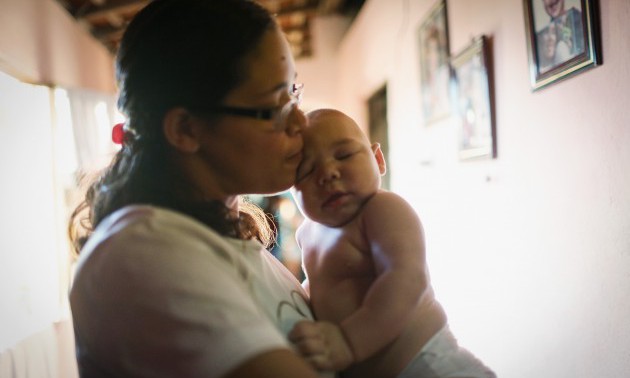
Source: Mario Tama / Getty
Update on Jan. 28 at 11:01 AM:
Today, the World Health Organization stated that the Zika virus is “spreading explosively” in an official statement, saying that approximately three to four million infections have affected those in the Americas over the last year.
Director-General Dr. Margaret Chan wrote: “The level of concern is high, as is the level of uncertainty…We need to get some answers, quickly.”
WHO has already been criticized for its slow response to the issue, similarly to the criticisms the organization faced in its response to the Ebola epidemic that killed more than 10,000 people. Chan states that WHO won’t wait for more definitive information from scientific research on the virus and that it will begin taking action against the disease immediately.
An emergency committee designated just for Zika is scheduled to take place on Feb 1.
Original story from Jan. 27:
The BBC reports that scientists are now working on a vaccine to treat the Zika virus, a quickly spreading mosquito-borne disease that has popped up in more than 20 countries around the world.
A group of scientists from the University of Texas Medical Branch are leading the charge. The researchers went to Brazil to begin studying cases and collecting samples. Now they are working in high-security laboratories in Galveston.
Scientists explain that they aren’t starting from scratch in their research, as they’ll be using existing vaccines that fight related illnesses like dengue fever, yellow fever and West Nile disease as a basis for the new medicine. However, although it may only take two years for scientists to finish developing the Zika vaccine, it could take another 10 to 12 years for the medicine to be approved by the US Food and Drug Administration.
President Obama has also intervened in the Zika epidemic by calling for a speedy response. He’s asking for new research to create better diagnostic tests, find vaccines and therapeutics, and educate Americans on the disease.
Zika, which causes birth defects and can lead to paralysis in adults, has the potential to become the biggest mosquito-borne disease to hit the global community since the West Nile virus. The seemingly mild flu-like virus was discovered in monkeys in Uganda back in 1947. The name ‘Zika’ stems from the African forest in which it was discovered.
From there, Zika spread to Pakistan and Indonesia, eventually making its way to Brazil in 2014, where it has since affected the most people. Zika’s biggest threat is to unborn children and causes the birth defect called “microcephaly,” a condition that leads to “abnormal smallness of the head, a congenital condition associated with incomplete brain development.” A total of 3,893 suspected cases of microcephaly have been documented in Brazil since October.
The virus travels through Aedes mosquitos, which are common in all nations in the Western Hemisphere with the exception of Canada and Chile.
There is no known cure, but many countries, including the United States, are taking drastic measures to ensure the safety of its citizens. Here are six things you need to know about the Zika virus:
1) 12 Cases Have Been Found In The U.S. So Far
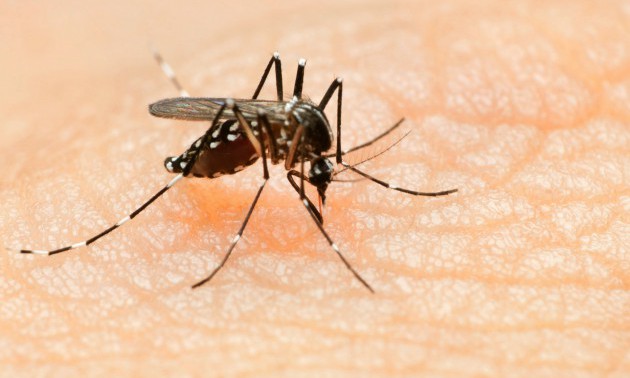
Source: Universal History Archive / Getty
The Zika virus was first confirmed in Houston, Texas earlier this month, but there have been reports of the case in America as far back as 2007. The Houston patient recently traveled to Latin America. Cases in California and New York have also been found in travelers. A baby born in Hawaii tested positive for Zika.
The virus’ symptoms include rashes, fever, headaches, pain behind the eyes, and joint pain. Only one in five people will experience symptoms that last up to seven days. While there are known Aedes mosquitos in America, there’s no proof they’re infected with the virus. Researchers predict the possibility of a Zika outbreak in America is relatively small. Because of window screens, ample access to insect repellent, and air conditioners, it is unlikely the virus will become a huge problem. [NBC Los Angeles]
2) Zika’s Link To Microcephaly Has Strengthened
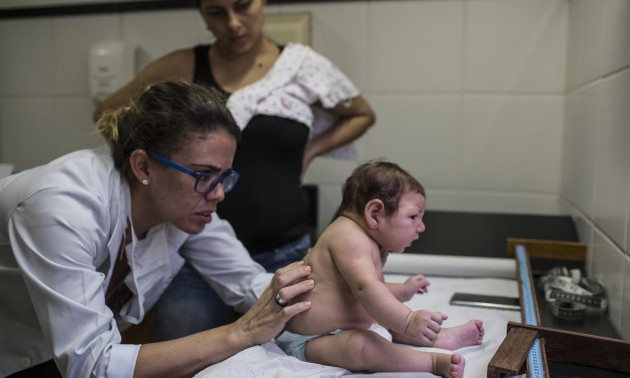
Source: The Washington Post / Getty
A connection to microcephaly and Zika was discovered in Brazil last year, when unborn babies tested positive for the birth defect. So far, there have been 3,500 cases of microcephaly in Recife, Pernambuco, the country’s most affected state. Microcephaly causes underdeveloped brains in children due to an abnormally sized skull. Life expectancy for children with microcephaly is reduced. There is no cure. Leaders in Colombia, Ecuador, El Salvador, and Jamaica have recommended women avoid pregnancy until 2017 to reduce the number of microcephaly cases. [BBC News]
3) Zika Has Been Compared To The Ebola Virus
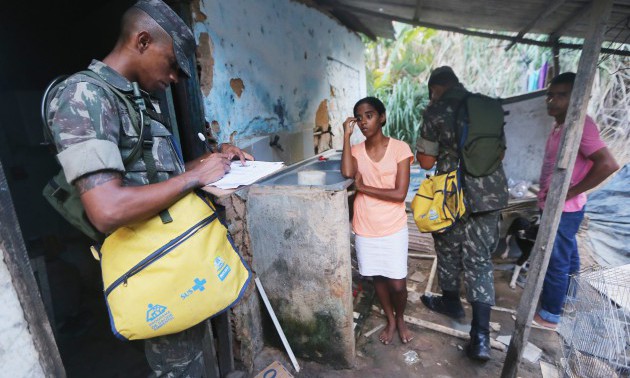
Source: Mario Tama / Getty
The Zika virus isn’t fatal, but researchers working to find a vaccine have likened the experience to that of the Ebola virus. Trudie Lang, a professor of global health at the University of Oxford, explained the process as a kind of deja vu. “We’ve got no drugs and we’ve got no vaccines,” Lang said. “It’s a case of deja vu because that’s exactly what we were saying with Ebola. It’s really important to develop a vaccine as quickly as possible.” Because of the uncertainty that lies in commercial success for drug companies, the timeline to create an effective vaccine can take up to three to five years. British and French drug companies are reviewing its vaccine technology in accordance with the Zika virus. [Reuters]
4) Two Cases Have Been Linked To Sexual Contact

Source: NELSON ALMEIDA / Getty
While both cases have been labeled a rarity, the Zika virus may have been sexually transmitted. The first case traces back to 2008. Dr. Brian D. Foy and his graduate student Kevin C. Kobylinski were in Senegal researching insect-borne diseases for their work at Colorado State University, when they were bitten several times by mosquitos. After returning to the States, the men displayed rashes and other flu-like symptoms; Dr. Foy also suffered from blood in his semen. Joy L. Chilson Foy, Dr. Foy’s wife, developed the same symptoms, but did not travel out of the state. Their frozen blood samples tested positive for the virus a year later. While Dr. Foy requested money to research the disease, there was little interest in Zika back then. In 2013, the second sexually transmitted case appeared when a 44-year-old Tahitian man was infected in French Polynesia. Zika was found in his semen after the virus disappeared from his blood. Doctors don’t believe the cases “warrant a large public health recommendation from the CDC,” but nevertheless, they should be studied. [New York Times]
5) Are The Olympic Games in Jeopardy?

Source: Mario Tama / Getty
Authorities in Brazil have assured the public that measures are being taken to battle the Zika virus for those participating in the 2016 Summer Olympic games in Rio de Janeiro. Mayor Eduardo Paes announced this week that inspectors will start spraying insecticide around the Sambadrome, where the upcoming Carnival celebration is set to take place. An estimated 200,000 health inspectors will also visit homes to inform and educate the public about the disease. [Deutsche Welle]
6) PAHO: Reducing Breeding Sites Will Result In Lower Possibility For Zika Outbreak
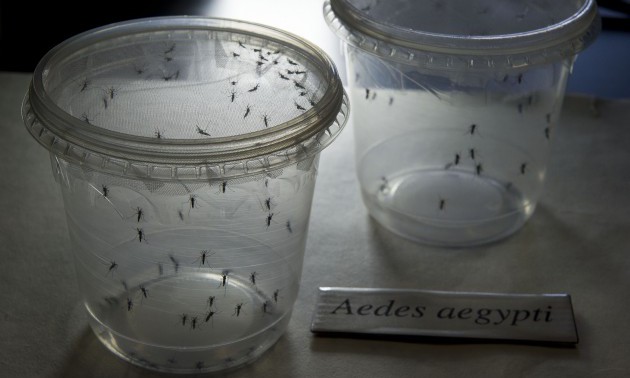
Source: NELSON ALMEIDA / Getty
In WHO’s alert to the public, the Pan American Health Organization recommended eliminating breeding sites for Aedes mosquitos in order to reduce instances of the disease. This means utilizing insect repellent and disposing of anything that can hold water, such as old tires and containers around the household. Other possibilities for transmission are currently under investigation, but blood donations and transfusions have been placed under precaution. Researchers recommend using screens and mosquito nets, and keeping windows and doors closed whenever possible. [PAHO]
HelloBeautiful’s Monique John and NewsOne’s Desire Thompson contributed to this report.
SEE ALSO:
The Poisoning Of A City: Photos Of Flint’s Water Crisis
SCOTUS: Ban On Juvenile Life Sentences Applies Retroactively
Could Zika Become The Next Big Epidemic? WHO Predicts Virus Will Spread Throughout The Americas
WHO Says Zika Is ‘Spreading Explosively’: Here’s 6 Things You Need To Know About The Virus was originally published on newsone.com






















